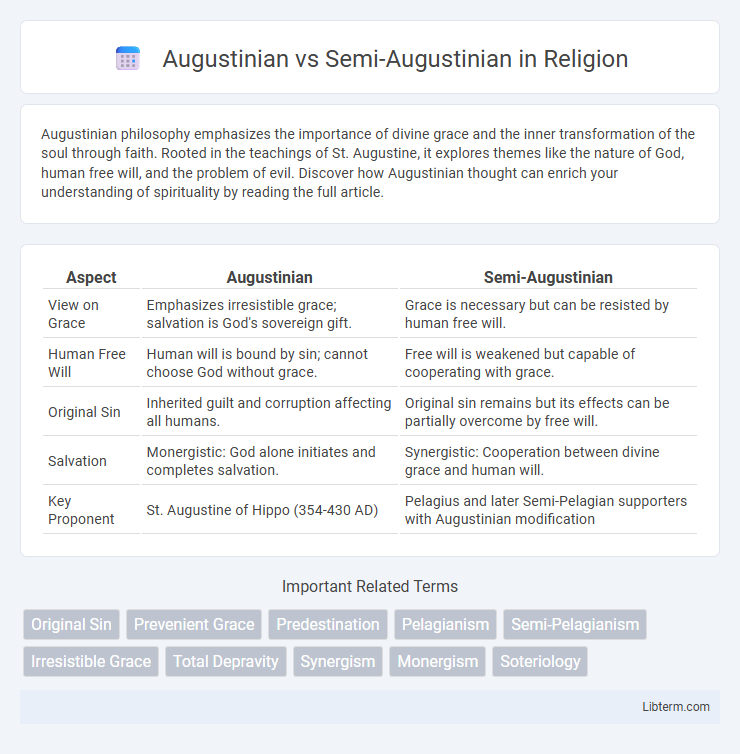Augustinian philosophy emphasizes the importance of divine grace and the inner transformation of the soul through faith. Rooted in the teachings of St. Augustine, it explores themes like the nature of God, human free will, and the problem of evil. Discover how Augustinian thought can enrich your understanding of spirituality by reading the full article.
Table of Comparison
| Aspect | Augustinian | Semi-Augustinian |
|---|---|---|
| View on Grace | Emphasizes irresistible grace; salvation is God's sovereign gift. | Grace is necessary but can be resisted by human free will. |
| Human Free Will | Human will is bound by sin; cannot choose God without grace. | Free will is weakened but capable of cooperating with grace. |
| Original Sin | Inherited guilt and corruption affecting all humans. | Original sin remains but its effects can be partially overcome by free will. |
| Salvation | Monergistic: God alone initiates and completes salvation. | Synergistic: Cooperation between divine grace and human will. |
| Key Proponent | St. Augustine of Hippo (354-430 AD) | Pelagius and later Semi-Pelagian supporters with Augustinian modification |
Introduction to Augustinian vs Semi-Augustinian Thought
Augustinian thought emphasizes the sovereignty of divine grace and predestination, rooted in the teachings of St. Augustine, who argued that human will is intrinsically bound by original sin and relies entirely on God's intervention for salvation. Semi-Augustinian theology maintains a nuanced position, affirming the necessity of grace while allowing for a more cooperative role of human free will in responding to God's call. This distinction represents a critical debate in Christian doctrine regarding the balance between divine sovereignty and human responsibility in the process of salvation.
Historical Context: Origins of the Debates
The historical context of the Augustinian versus Semi-Augustinian debates traces back to early Christian controversies surrounding predestination and grace during the 4th and 5th centuries. Augustine of Hippo's strict views on divine predestination contrasted sharply with Semi-Augustinian interpretations that allowed for a more synergistic relationship between human free will and God's grace. These theological divergences influenced major Church councils and shaped the development of Western Christian doctrine on salvation and human agency.
Key Figures: Augustine and His Interpreters
Augustinian theology centers on the teachings of Saint Augustine, whose doctrines on grace, original sin, and predestination profoundly shaped Western Christian thought. Semi-Augustinianism represents a moderating interpretation, emphasizing human free will while still recognizing divine grace, with key interpreters like Prosper of Aquitaine and Cassian who sought to balance Augustine's strict predestinarian views. The dialogue between Augustine's original texts and his interpreters highlights the theological tensions between divine sovereignty and human responsibility.
Defining Augustinian Theology
Augustinian theology centers on the doctrines of original sin, divine grace, and predestination as articulated by St. Augustine, emphasizing humanity's total dependence on God for salvation. Semi-Augustinian theology maintains Augustine's views on grace and sin but allows for a more cooperative role of human free will in accepting grace. The crucial distinction lies in the degree of human agency: Augustinians uphold irresistible grace and total depravity, while Semi-Augustinians affirm prevenient grace enabling humans to respond freely to God's call.
Understanding Semi-Augustinianism
Semi-Augustinianism represents a theological perspective that mediates between strict Augustinian doctrines of original sin and predestination and more moderate views emphasizing human free will. It acknowledges Augustine's emphasis on the necessity of divine grace for salvation while permitting a limited role for human cooperation in the redemption process. This approach aims to balance the sovereignty of God with responsible human agency, distinguishing itself from both rigid Augustinian determinism and Pelagian optimism.
Core Doctrines: Grace, Free Will, and Predestination
Augustinian theology asserts that divine grace is irresistible and essential for salvation, emphasizing original sin's total corruption of human will, which renders free will incapable of choosing good without grace. Semi-Augustinianism maintains that while grace is necessary, humans retain a form of free will sufficient to cooperate with grace, allowing partial human contribution in the process of salvation. Predestination in Augustinian thought is unconditional, grounded solely in God's sovereign will, whereas Semi-Augustinianism adopts a more synergistic view, suggesting predestination aligns with God's foreknowledge of human faith and cooperation.
Major Theological Differences
Augustinian theology emphasizes predestination and the total depravity of human nature, asserting that God's grace is irresistible and essential for salvation. Semi-Augustinian views soften original sin's effects, promoting human free will's cooperation with divine grace in the salvation process. The core difference lies in the extent of human freedom and grace's role, with Augustinians advocating monergism and Semi-Augustinians supporting synergism.
Impact on Church Doctrine and Councils
Augustinian theology, emphasizing original sin and divine grace, profoundly influenced Church doctrines such as the formulation of original sin at the Council of Carthage and later the Council of Trent, reinforcing predestination and grace as essential for salvation. Semi-Augustinian views moderated some strict predestinarian elements, promoting human free will's cooperation with grace, impacting debates at the Council of Orange (529 AD), which rejected Pelagianism but affirmed human agency in salvation. These distinctions shaped the Church's stance on grace, free will, and original sin throughout doctrinal development and ecumenical councils.
Contemporary Relevance and Debates
Augustinian theology emphasizes predestination and divine sovereignty, influencing contemporary debates on free will and grace in Protestant and Catholic contexts. Semi-Augustinians moderate Augustine's strict predestinarian views, advocating a synergy between divine grace and human free will, which shapes modern discussions on moral responsibility and salvation. Current theological discourse often centers on these contrasting perspectives, impacting ecumenical dialogues and ethical frameworks in Christian thought.
Conclusion: Lasting Influence on Christian Theology
Augustinian theology, grounded in the doctrines of original sin and divine grace, profoundly shaped Western Christian thought, influencing doctrines on salvation, human will, and divine sovereignty. Semi-Augustinian perspectives modified these ideas by emphasizing a cooperative role between human free will and grace, which impacted later theological debates on predestination and moral responsibility. Both frameworks have left a lasting legacy on Christian theology, with Augustinian views dominating Catholic and Protestant traditions while Semi-Augustinian ideas persist in dialogues concerning free will and grace.
Augustinian Infographic

 libterm.com
libterm.com